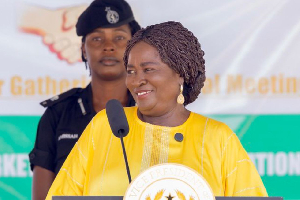Accra, May 12, GNA - The national co-ordinator of the National Disaster Management Organisation (NADMO), Mr Kofi Porturphy, on Tuesday stressed the need for schools to draw contingency plans to mitigate the spread of Influenza H1N1 2009 in schools.
Speaking at a day's seminar on Prevention and Control of H1N1 for Directors of Education and Heads of Education Institutions in the Greater Accra Region, Mr Porturphy said although the pandemic was not in a crisis situation, schools should be abreast with the causes and characteristics of the disease.
It was under the theme: "Strengthening Pandemic Influenza H1N1 Preparedness and Response in Schools". He said NADMO would collaborate with Ghana Education Service (GES) to educate students on the disease and be in constant consultation with schools and mobilise resources when necessary to support them. Dr John Yabani, Director of Accra Metropolitan Health Directorate, presenting a paper on Influenza H1N1 2009, said confirmed cases in the country were about 700 with the Region recording the highest of over 400 confirmed cases.
He said the H1N1 virus was first detected on April 17, 2009 in California and in Ghana on August 5, the same year, and that from January to date 56 cases had been confirmed.
Dr. Yabani explained that the most affected age group are children under five years, especially those below two years, adults aged 65 years and above, pregnant women, people with asthma, stroke, mental retardation, chronic lung diseases, diabetes, kidney disorders, and obstructive pulmonary disease.
It is caused by a virus that affects the respiratory system and typically spreads through coughs and sneezes or by touching contaminated surfaces.
The disease, which may present itself like a common cold with cough, sore throat, fever, catarrh, general weakness, body ache and headache, and sometimes vomiting or diarrhoea, may also lead to severe pneumonia with difficulty in breathing, rapid breathing and chest pain. Dr. Yabani said symptoms could last up to a week and that the disease was highly transmissible, with majority of cases presented as mild diseases especially in younger people.
He said regular hand washing with soap and water, hand rubbing with alcohol, keeping a distance from infected persons, and wearing of protective clothing by those taking care of patients, were some measures to stop the spread of the virus. Dr Yabani said massive public education, sensitisation of teachers, health personnel and the media on the pandemic was crucial and urged parents not to hesitate in sending their children to the health facility if they detect any symptoms of cold.
Mrs. Mercy Manyala of UN Commission of Human Affairs said the pandemic knew no boundaries and noted that instituting a contingency plan for schools was a step in the right direction, especially the panic that was created with the outbreak in schools.
"With early detection, the patient is treated with the necessary medication and put under observation together with the close relatives to prevent further transmission to other people," she said.
The Ghana Health Service (GHS) in collaboration with World Health Organisation (WHO) would soon take delivery of vaccines to mitigate the spread of the influenza H1N1 2009 to reduce the impact of the pandemic on health and minimise disruption to society and the economy, she said, adding that they were expected in batches of 500,000 doses.
The vaccines upon arrival would be timely distributed to all storage points within seven days, at the national, regional, district, sub-district, health facility levels for vaccination of target population. Ghana is among the few countries WHO had tipped to deploy influenza vaccines to control the spread of the virus.
Mr Michael Adjabeng, Acting Head of Disease Surveillance Department at GHS in an interview with GNA, said priority would be given to the vaccination of all health workers and national security personnel since they would be at the forefront of affairs during the exercise. 12 May 10
Health News of Wednesday, 12 May 2010
Source: GNA












